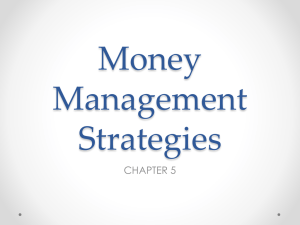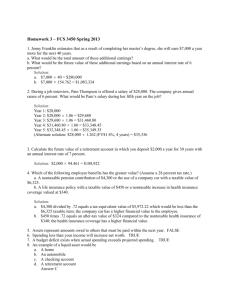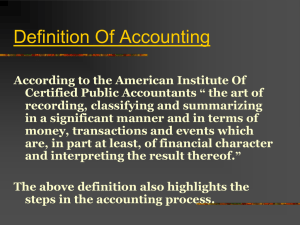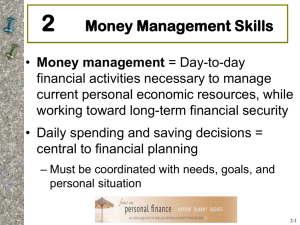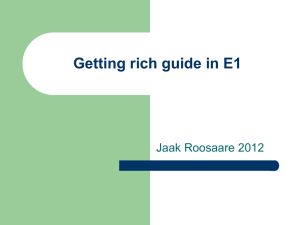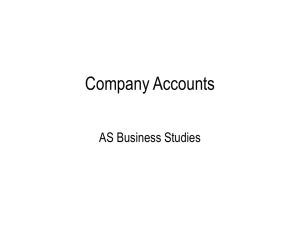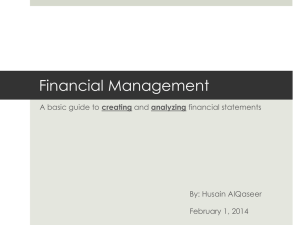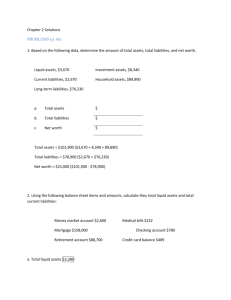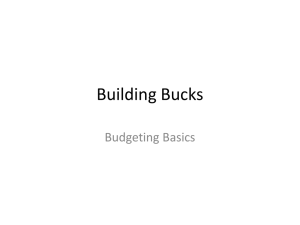File
advertisement
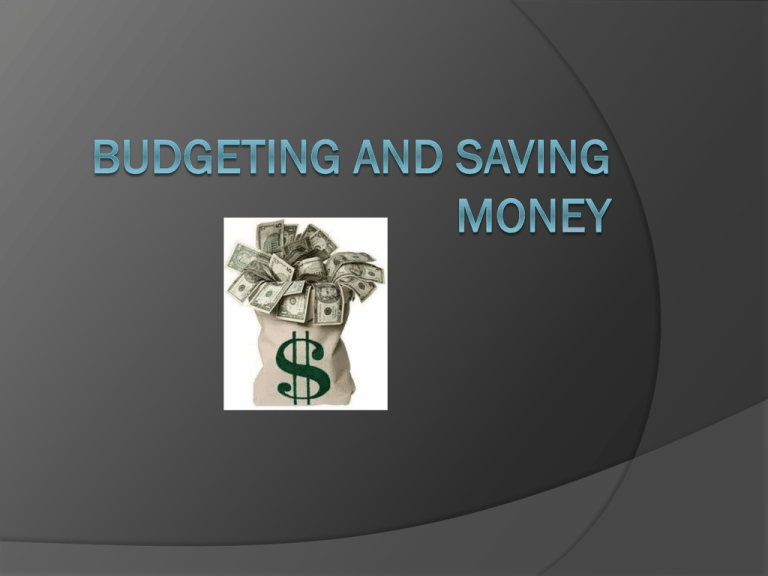
Statement of Financial Position Who is wealthier? Ian •Mitchell Income $30,00 •Income-$85,000 Net Worth $45,000 •Net Worth-$28,000 Statement of financial position Your net worth = wealth! Net worth: the objective measure of financial wealth. Wealth: Measurement of how much a person or household owns once all debts have been paid Net Worth Net Worth is more about how you MANAGE your income. Someone can have a high income, but low net worth. Living within your means will help build your net worth. Your net worth is actually the difference between your assets and liabilities. How do you determine your net worth? Statement of financial position: that describes an individual or family’s financial condition on a specified date. Uses assets, liabilities, and net worth. 3 components of Statement of Financial Position: 1. Assets 2. Liabilities 3. Net worth Assets Asset: everything a person owns with monetary value Can be cash Can also be value of personal possessions Examples: Checking account, savings account, money in stocks, value of current home or car ○ The value of these assets must be what you can realistically sell them for TODAY, not the purchase price. Kellybluebook.com Liabilities Liabilities: debt or obligations owed to others Can be bills or loans that are due Can also be value owed on credit cards Liabilities What is recorded in the liabilities section of a personal financial statement? The amount you owe if you were to pay the amount owed in full today. ○ Example: You have an auto loan that you pay $180 per month on; if you continued payments till it was paid off $6300. ○ If paid the loan off in full today $5490 Amount recorded on statement. Net Worth The difference between your liabilities and your assets is your Net Worth. Assets – Liabilities = Net worth Assets Liabilities Checking Account $540 Savings Account $3250 Current Bills Due $1,250 Credit Cards Owed $4500 Stocks & Bonds $10,000 Home Value $92,000 Mortgage Owed $68,000 Car Value $2,300 Total: $108,090 Total $73,750 Net Worth:$34,340 How to increase Net Worth Your net worth increases when your assets increase or your liabilities decrease. Ideal assets Ideal Liabilities Update your personal financial statement at least once a year, Especially if there are dramatic changes to assets or liabilities How to Increase Net Worth By properly using money management tools! Statement of financial position (updated yearly) Income and Expense Statement Using a spending plan So… Who is wealthier? Ian •Mitchell Income $30,00 •Income-$85,000 Net Worth $45,000 •Net Worth-$28,000 Income and Expense Statement Jessica is paid once a month. She puts enough money in the bank to cover her expenses every month; but still runs out of money before all expenses are paid. Meet Jessica… -Jessica made a list of all her expenses -Doesn’t expect to have more than $1000 in expenses every month; but still runs out! -Where is her money going? Expense Amount Rent/Utilities $500 Health Insurance $100 Renter’s Insurance $10 Car Insurance $40 Gas $100 Groceries $100 Cell phone $70 Personal Care $30 Entertainment $50 Total $1000 Jessica… Jessica forgot to account for the $1.50 coffee she buys every morning and the lunch she has with friends about once a week. $1.50 $45 $540 on Coffee! $8.00 $32 $416 on Lunch! ○ Jessica is forgetting $77 that she thinks is minimally nothing! The costs add up Item Avg Cost Of Item Cost/Month if purchased daily Approximate cost per year if purchased daily 16 oz pop $1-$2 $30-$60 $365-$730 16 oz Energy Drink $2-$3 $60-$90 $730-$1095 16 oz Starbucks coffee $2.50-$4 $75-$120 $900-$1440 Candy Bar $1 $30 $360 Income and Expense Statement A statement that lists and summarizes income and expense transactions that have taken place over a specific period of time, usually a month or year. ○ Can help evaluate past financial decisions to increase net worth Income and Expense Statement 3 Components Income: Money received Expenses: money spent Net Gain/Net Loss: Your income minus your expenses Spending Plans Think of a personal/financial goal. Based on your current spending, is it realistic to achieve your goal? Think of how you can adjust your spending to achieve this goal… This is the beginning of a spending plan! Spending Plan A document used to record both planned and actual income and expenses over a period of time. A BUDGET! Spending Plan Look at your current financial position and how you have managed money in the past. Determine what changes to make & then make changes! Why is a spending plan so important for financial planning? Manage $ in a positive manner Increase net worth Help set and reach goals Analyze opportunity costs and trade offs to maximize financial well being

